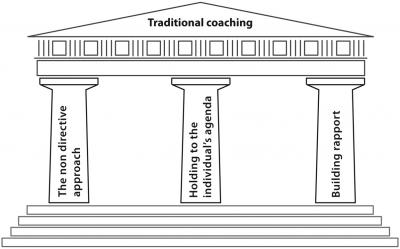Continuing their series on challenging coaching, Ian Day and John Blakey focus this time on the core principles of the profession.
Is coaching rooted in the past because of its links with the associated profession of counselling? We argue that this history is preventing coaching from becoming the transformational force it needs to be in the current economic climate.
Coaching is a very young profession; the International Coach Federation was formed in 1995; the Association of Coaching was formed in 2002. Counselling had a great impact during the early years in the growth of coaching, in particular the work of Carl Rogers and Gerard Egan. Carl Rogers was one of the most influential thought leaders developing the person-centered non-directive therapeutic approach. Gerard Egan built on this approach and developed a three-stage model of building a relationship of exploration, developing a new understanding and moving to action.
These approaches will feel incredibly familiar to coaches as the core principles of therapy have been used by the coaching profession to provide a structure, an ethical basis and fundamental principles. So coaching owes a debt of gratitude to counselling and this evolutionary route has served coaching well up to a point. Distilled down the core principles of traditional coaching are a person-centered approach which is non-directive, holding to the individual's agenda and building rapport. It is as if these are the three pillars which support a sacred temple, and these pillars can never be questioned:

However, we argue that coaching has sucked in too much from therapy, particularly as the business environment has changed, and that the core principles of traditional coaching have limitations and hold risks.
If a coach is in service of the coachee and the sponsoring organisation, does it matter if an intervention is directive or non-directive? We believe that, coaches should be free to ask more 'directive' questions in order to achieve the desired goals of coaching contract. For example, a coachee may not trust their own ability to think deeply or long enough to generate alternative options; they may have ideas but do not have the confidence to voice them. In such a situation, by offering suggestions, the coach will create a breakthrough and provide confidence within the coachee through confirmation and reinforcement. Also, there is a difference between offering advice or suggestions and directing the coachee to a solution pre-determined by the coach. For example, if a coachee is stuck and has ground to a halt, the coach can kick-start their thinking by offering suggestions. Once the coachee has exhausted their own ideas the coach can offer advice - "have you considered this option...?" These suggestions and advice will spark off the coachee's ability to think more creatively and move forward.
Holding to a coachee's agenda holds the risk of collusion, irrelevance and self-obsession. We all know that there are times when a coachee will avoid issues that are uncomfortable but essential in achieving the desired outcome. A coach must be able to challenge and highlight avoidance and direct the conservation to address these matters and get into what we refer to as the Zone Of Uncomfortable Debate (ZOUD) which is the area in which the conversation is tense but necessary to resolve a difficult issue. The wider context here is that if the coach focuses only on the coachee's agenda, then the needs of the sponsoring organisation may be ignored. It is vital that coaching is linked to the achievement of wider business results. A focus on the coachee's agenda is too narrow.
The final column in the traditional coaching temple is ‘building rapport'. Executive coaches typically work with robust and functioning people who can be pushed, and positively value challenge. Therefore, regarding the act of building rapport as sacrosanct will limit coaching interventions. The coach cannot enter the Zone Of Uncomfortable Debate (ZOUD) if they are not willing to risk breaking rapport and if the ZOUD is not entered then the heart of the issue or the 'elephant in the room' many go unresolved. The greatness within a coachee cannot be freed if the coach holds a functioning coachee in a safe place, which cocoons them unnecessarily.
Ian and John's book 'Challenging Coaching- Going beyond traditional coaching to face the FACTS' published by Nicholas Brealey Publishing is available on Amazon. More resources can be accessed via www.challengingcoaching.co.uk. This is the second of a monthly column on TrainingZone to explore the detail of challenging coaching










